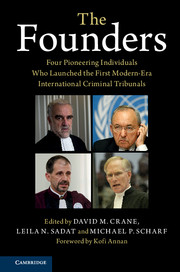 The Founders
The Founders 1 - International Criminal Justice: The Journey from Politics to Law
from PART I - PUTTING IT ALL IN CONTEXT
Published online by Cambridge University Press: 23 March 2018
Summary
The establishment of international criminal courts and tribunals is a relatively new phenomenon. As judicial bodies, they endeavor to operate with all the objectivity, neutrality, and commitment to the rule of law that their mandates require and their statuses confer. Yet they operate in a highly complex sociopolitical environment. They attract controversy and criticism because they typically apply international law directly to high-ranking and powerful people – presidents, prime ministers, military officers, and others with influence and importance. These individuals, if convicted, may be imprisoned or even, in the case of the Nuremberg trials, executed. So the stakes in any international criminal law case are high.
The judges of these courts and tribunals, and the quality of their trial management and jurisprudence, is an important component of determining the impact and success a given tribunal will have and the respect it will acquire. Yet the prosecutors who bring the cases forward are the “engines” of this emerging system of international criminal justice as well as its “face.” Thus, they often bear the brunt of critiques levied against these tribunals. Because international criminal courts and tribunals are charged with a mandate of applying the law in conflict situations that involve weighty questions of war and peace, as well as human survival, they inevitably occupy “a small center in a whirling international vortex” in which almost everything they do “has political implications.”
Since the 1990s, several international courts and tribunals have been established to try individuals responsible for the commission of war crimes, crimes against humanity, genocide, and even terrorism. The prosecutors of those institutions, some of whom are featured in this book, have charged more than 300 individuals with the commission of atrocities that span nearly two decades of conflict on nearly every continent, and one of their successors has ongoing investigations on the others. These institutions have, in a way, been tasked with taking political judgments about the inappropriateness of certain behaviors committed by states and non-state actors, such as the levying and conduct of war and attacks upon civilians, and turning them into precedents establishing the illegality of individuals acting within these atrocity zones.
- Type
- Chapter
- Information
- The FoundersFour Pioneering Individuals Who Launched the First Modern-Era International Criminal Tribunals, pp. 19 - 31Publisher: Cambridge University PressPrint publication year: 2018
